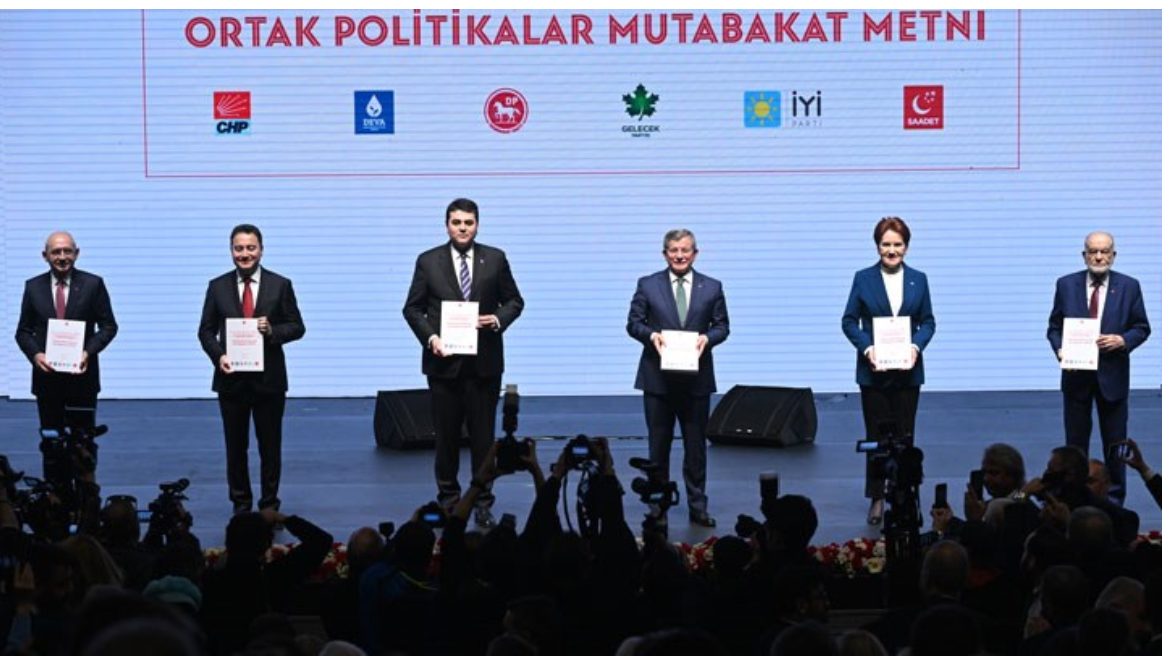In a historic moment for Turkish democracy, six opposition parties ranging from Islamist to center-left issued a 240 page document describing the policies to be adopted if they capture the presidency and the Grand Assembly.
The moment is historic, because in Turkey’s 7-decade long experience with democracy, never have so many parties united around a common goal prior to elections. PA Turkey Editors also concluded that the document is historic in a different sense: It promises undo Erdogan’s legacy of authoritarianism, human rights abuses, de-institutionalization and arbitrary rule.
The below is the take by France 24, the first somewhat comprehensive article we could locate. We shall follow up with more details on the government program, its implications and weaknesses.
Turkey’s opposition vowed on Monday to crimp the president’s powers and broadly expand democratic rights if they seize power in May 14 presidential and parliamentary polls, wrote France 24.
The six parties that are united against President Recep Tayyip Erdogan also pledged to agree on February 13 to a joint candidate for the crucial vote — widely seen as Turkey’s most consequential in generations.
The opposition’s long-awaited election programme aims to roll back many of the powers Erdogan has amassed over his two-decade rule.
It limits the president to a seven-year term and makes a powerful new prime minister accountable to parliament.
“We will shift to a strengthened parliamentary system,” the programme says.
“We will put an end to the president’s power to issue decrees.”
Erdogan began his rule in 2003 as prime minister and was elected president — at the time a more ceremonial post — when his mandates ran out in 2014.
He then rammed through constitutional changes in 2017 that eliminated the premiership and created a powerful new executive that allowed the president to effectively rule by decree.
The opposition pledged to change the constitution back to the way things worked throughout most of Turkey’s post-Ottoman history.
Constitutional referendum
Constitutional changes can be ratified by 400 votes in the 600-seat parliament.
They can also be put up for a national vote if the opposition gathers the 360 votes needed to trigger a constitutional referendum.
The opposition’s pledge to rewrite the constitution adds particular importance to the parliamentary vote.
Erdogan briefly lost control of parliament during his second decade in power and now relies on support from a far-right party that has seen its support slip in the past year.
Opinion polls point to a tightly contested election that is too close to call.
The opposition pledged to “urgently” amend the constitution and “put an end to the vague and arbitrary restriction of the freedoms of assembly and demonstration”.
“We will strengthen the freedoms of thought, opinion and expression,” it added.
Erdogan unleashed sweeping purges after a failed 2016 coup attempt that curbed many of the freedoms enjoyed under his more prosperous and publicly popular first years of rule.
Analysts estimate that 90 percent of Turkey’s media are now under government or its business allies’ control.
Thousands of activists — many of them Kurds — are languishing in prison on terror-related charges that rights groups believe Erdogan is using to crack down on political dissent.
EU membership
The programme was unveiled at a ceremony attended by cheering crowds thirsting for a chance to reverse Erdogan’s transformation of Turkey into a more religiously conservative country that was slowly losing support from the West.
Some of the biggest applause came from promises to crack down on corruption and restore the strength of Turkey’s traditional institutions — including its state media.
The opposition vowed to make Turkey’s TRT national broadcaster and Anadolu state news agency abide by “the principles of independence and impartiality”.
Its foreign policy section stressed the importance of restoring “mutual trust” with the United States and achieving Turkey’s stalled goal of gaining “full membership in the European Union”.
It made no direct mention of Russia’s invasion of Ukraine.
“We will maintain relations with the Russian Federation with an understanding that both parties are equal and strengthened by balanced and constructive dialogue at the institutional level,” the programme said.
Erdogan’s refusal to join Western sanctions on Moscow has turned Turkey into a key route for Russia to access Western goods and services.
The resulting boom in bilateral trade has added to Erdogan’s tensions with Washington and the European Union.
Follow our English language YouTube videos @ REAL TURKEY: https://www.youtube.com/channel/UCKpFJB4GFiNkhmpVZQ_d9Rg
And content at Twitter: @AtillaEng
Facebook: Real Turkey Channel: https://www.facebook.com/realturkeychannel/
